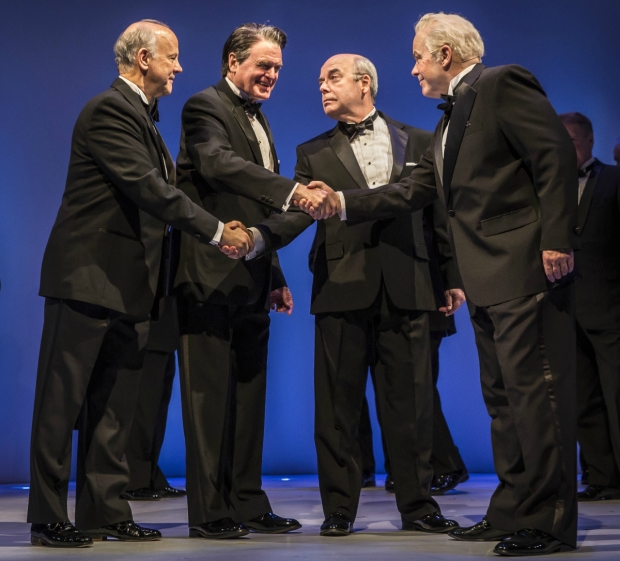Blind Date

(© Liz Lauren)
One of the most significant political events of the 1980s — the thawing of relations between the USA and the USSR — began with a lunch date. In March of 1985, America’s Secretary of State George Shultz and Soviet Minister of Foreign Affairs Eduard Shevardnadze meet over cocktails and shrimp cocktail. This historic meeting is the subject of playwright Rogelio Martinez’s Blind Date at the Goodman Theatre.
During this event, Shultz (Jim Ortlieb) and Shevardnadze (Steve Pickering) make overtures and insinuations and feel each other out until, finally, a connection is made: A letter written by President Ronald Reagan (Rob Riley) will be passed into the hands of the newly elected general secretary of the Soviet Union, Mikhail Gorbachev (William Dick).
After much negotiation, their correspondence leads to a face-to-face meeting, the first between the two superpowers in the better part of a decade. Reagan and Gorbachev are accompanied to the Geneva Summit by their wives, Nancy Reagan (Deanna Dunagan, who brings full-throttle charm and backbone) and Raisa Gorbachev (the delightfully sharp-tongued Mary Beth Fisher), as well as hordes of political advisors (in all, a cast of 21).
Reagan is certainly the focal point of Blind Date, and Riley is up to the task. While he doesn’t particularly resemble the president, he does master Reagan’s cadences and vocal tics, which serves the work well. Gorbachev is slightly underwritten and inscrutable, but Dick injects the role with vigor, and he shares a crackling rapport with both Riley and Pickering, who plays the shrewd Shevardnadze with a keen subtlety that is fascinating to watch.
The magnificent white walls of Riccardo Hernández’s stark set turn in concentric circles, bringing to mind the inner workings of a watch. The clock is ticking, Blind Date reminds its audience. The likelihood of nuclear war is measured in years, the effects of a potential nuclear strike charted by the minute.
Though the stakes are as high as nuclear war itself, director Robert Falls strikes an austere, dispassionate tone throughout the play. Even behind closed doors, Reagan and Gorbachev are more cautious than desperate. Frequent asides and extended expositional interludes give the entire endeavor a scholastic quality. Thomas J. Cox carries the brunt of these, often addressing the audience as Reagan’s biographer Edmund Morris. Cox gives a fine performance, injecting warmth and wit into an otherwise thankless role.
This is not to say that Blind Date rigidly adheres to the public record. Indeed, the finest moments of Martinez’s script come from invented or expanded moments of intimacy between the leaders and their wives, as well a sharply comedic tête-à-tête over teabags, as Raisa and Nancy match passive-aggressive wits at their own Tea Summit (while dressed to the nines by costume designer Amy Clark).
With a languid pace and overlong exposition, Blind Date cannot be called a political thriller, but it is too restrained and formal to be seen as a character drama. Instead, the play strikes an unsteady balance between the two and creates something endearing, if not necessarily enthralling.











